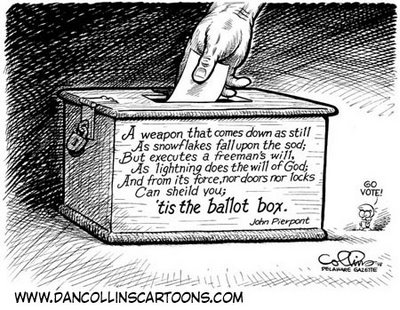US warned of ballot box chaos as elections near
 With polling in the US elections less than two weeks away, a new report by electionline.org, a non-partisan organisation, predicts that as many as ten states are not ready for the vote and that the election could be thrown into chaos.
With polling in the US elections less than two weeks away, a new report by electionline.org, a non-partisan organisation, predicts that as many as ten states are not ready for the vote and that the election could be thrown into chaos.
"Machine failures, database delays and foul-ups, inconsistent procedures, new rules and new equipment have some predicting chaos at the polls at worst, and widespread polling place snafus at best," the report says.There is also a danger that the electronic databases could be open to hacking.
The mid-term elections will be the first national test of new voting procedures introduced in the aftermath of the 2000 election debacle in Florida, when it took a month of court challenges and recounts of punch-card ballots before George W Bush was declared to have won the state, and became president.In the wake of that fiasco, Congress allotted $3.8bn (£2bn) to the states to modernise voting lists and replace the old-style punch-card systems with electronic voting machines by early 2006.
Election officials in more than 30 states opted for touch-screen voting machines that use a series of prompts to guide voters through the ballot. But the new machines have merely reawakened the old anxieties about miscounted votes and deliberate fraud.
In many states, voters will be casting their votes electronically for the first time. The officials at the polling stations may be equally inexperienced, and because such workers are typically elderly and retired, critics say they may be particularly poorly equipped to deal with any technological problems.
Those concerns crystallised last month, when a Princeton professor of computer science, Edward Felton, and two colleagues managed to hack into a new electronic voting machine without detection and install a virus that could alter vote counts - and go on to infect a wider network of machines.
The exercise, which Mr Felton repeated on television, took about a minute to complete.
I have never understood why the world's leading democracy would install a voting system that fails to leave a paper trail for verification. Surely after the debacle of Florida in 2000, people would be anxious to avoid any situation where the result was open to that level of dispute ever again?
Electronic voting systems ask for an awful lot of trust from the electorate towards the people who write the software for the system. Anyone with even a modicum of knowledge of how computers work, knows how vulnerable such a system is to tampering.
Nor do possible problems have to arise from malicious intent. Human error is also a major problem with such a system:
During the 2004 elections in North Carolina, polling officials failed to notice the constant flashing of a warning light on the voting machine indicating that its memory was full. More than 4,400 votes were lost as the result of their inattention. In that same election year, a software error in Texas polling stations led to a vote overcount, with 100,000 more votes registered than had been cast.The best system in the world is a pencil and a piece of paper. It's worked for as long as I can remember. If it ain't broke, don't fix it.
Click title for full article.The Electionline study predicts 10 states could face similar fiascos this time around because of computer security, inexperienced or elderly poll workers, and a network of new regulations meant to prevent illegal immigrants from voting.
Over the period of the past six years, the number of states requiring voters to show identification before they are given a ballot has risen from just 11 states to 24 states this year.
The study said it anticipated problems in Arizona, Colorado, Connecticut, Florida, Indiana, Maryland, New York, Ohio, Pennsylvania and Washington state.
tag: mid-term, elections, voting, electronic, databases, systems,























2 comments:
"electronic databases could be open to hacking"
Could be, Kel? They are completely open to hacking. The entire system is relying on Diebold's assertion that election officials aren't evil. Election officials like Ken Blackwell.
I was being rather generous wasn't I Bhc? Oh the lengths we go to in order to appear impartial!
Post a Comment